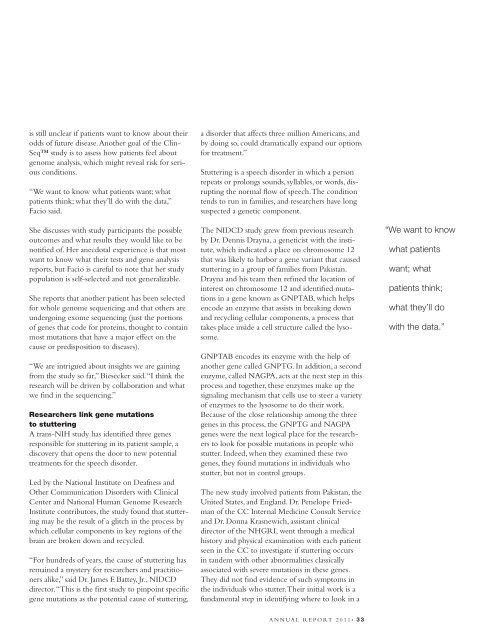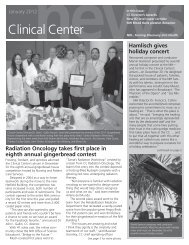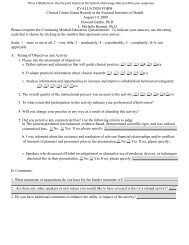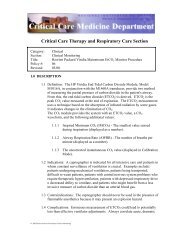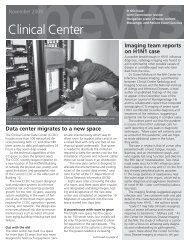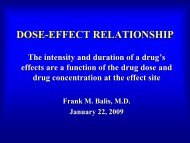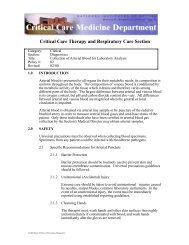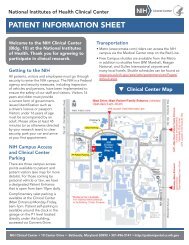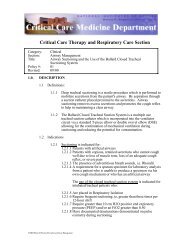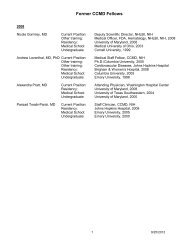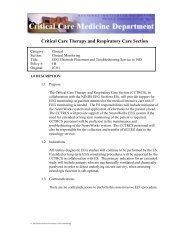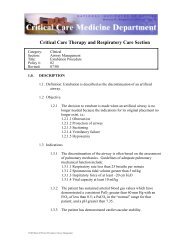2011 - NIH Clinical Center - National Institutes of Health
2011 - NIH Clinical Center - National Institutes of Health
2011 - NIH Clinical Center - National Institutes of Health
Create successful ePaper yourself
Turn your PDF publications into a flip-book with our unique Google optimized e-Paper software.
is still unclear if patients want to know about theirodds <strong>of</strong> future disease.Another goal <strong>of</strong> the Clin-Seq study is to assess how patients feel aboutgenome analysis, which might reveal risk for seriousconditions.“We want to know what patients want; whatpatients think; what they’ll do with the data,”Facio said.She discusses with study participants the possibleoutcomes and what results they would like to benotified <strong>of</strong>. Her anecdotal experience is that mostwant to know what their tests and gene analysisreports, but Facio is careful to note that her studypopulation is self-selected and not generalizable.She reports that another patient has been selectedfor whole genome sequencing and that others areundergoing exome sequencing (just the portions<strong>of</strong> genes that code for proteins, thought to containmost mutations that have a major effect on thecause or predisposition to diseases).“We are intrigued about insights we are gainingfrom the study so far,” Biesecker said.“I think theresearch will be driven by collaboration and whatwe find in the sequencing.”Researchers link gene mutationsto stutteringA trans-<strong>NIH</strong> study has identified three genesresponsible for stuttering in its patient sample, adiscovery that opens the door to new potentialtreatments for the speech disorder.Led by the <strong>National</strong> Institute on Deafness andOther Communication Disorders with <strong>Clinical</strong><strong>Center</strong> and <strong>National</strong> Human Genome ResearchInstitute contributors, the study found that stutteringmay be the result <strong>of</strong> a glitch in the process bywhich cellular components in key regions <strong>of</strong> thebrain are broken down and recycled.“For hundreds <strong>of</strong> years, the cause <strong>of</strong> stuttering hasremained a mystery for researchers and practitionersalike,” said Dr. James F. Battey, Jr., NIDCDdirector.“This is the first study to pinpoint specificgene mutations as the potential cause <strong>of</strong> stuttering,a disorder that affects three million Americans, andby doing so, could dramatically expand our optionsfor treatment.”Stuttering is a speech disorder in which a personrepeats or prolongs sounds, syllables, or words, disruptingthe normal flow <strong>of</strong> speech.The conditiontends to run in families, and researchers have longsuspected a genetic component.The NIDCD study grew from previous researchby Dr. Dennis Drayna, a geneticist with the institute,which indicated a place on chromosome 12that was likely to harbor a gene variant that causedstuttering in a group <strong>of</strong> families from Pakistan.Drayna and his team then refined the location <strong>of</strong>interest on chromosome 12 and identified mutationsin a gene known as GNPTAB, which helpsencode an enzyme that assists in breaking downand recycling cellular components, a process thattakes place inside a cell structure called the lysosome.GNPTAB encodes its enzyme with the help <strong>of</strong>another gene called GNPTG. In addition, a secondenzyme, called NAGPA, acts at the next step in thisprocess and together, these enzymes make up thesignaling mechanism that cells use to steer a variety<strong>of</strong> enzymes to the lysosome to do their work.Because <strong>of</strong> the close relationship among the threegenes in this process, the GNPTG and NAGPAgenes were the next logical place for the researchersto look for possible mutations in people whostutter. Indeed, when they examined these twogenes, they found mutations in individuals whostutter, but not in control groups.The new study involved patients from Pakistan, theUnited States, and England. Dr. Penelope Friedman<strong>of</strong> the CC Internal Medicine Consult Serviceand Dr. Donna Krasnewich, assistant clinicaldirector <strong>of</strong> the NHGRI, went through a medicalhistory and physical examination with each patientseen in the CC to investigate if stuttering occursin tandem with other abnormalities classicallyassociated with severe mutations in these genes.They did not find evidence <strong>of</strong> such symptoms inthe individuals who stutter.Their initial work is afundamental step in identifying where to look in a“We want to knowwhat patientswant; whatpatients think;what they’ll dowith the data.”ANNUAL REPORT <strong>2011</strong>• 33


